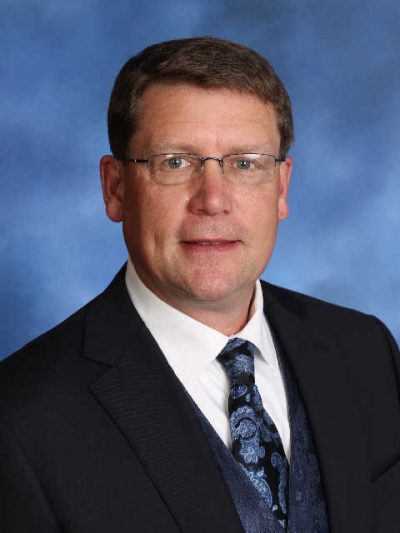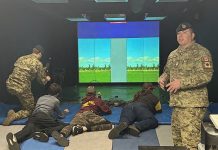Larry Hope
Director of Education TLDSB
As we begin the new year and find ourselves in times of uncertainty, we are often faced with questions about how our decisions are made. Our school communities expect transparency, and while we can’t be all things to all people or give everyone what they want, we do our best to provide clear answers to questions that come our way. Additionally, when we make decisions – financial, program, or otherwise – we always do our best to keep the classroom experience and programming at the heart of those decisions. Sometimes, however, it is difficult to provide every detail and cover every nuance in our explanations.
We all know about the challenges in our schools and communities these days as a result of protracted and ongoing negotiations between the province and unions. The impact of this conflict in our schools cannot be denied. It is simply not business as usual, with many activities and events being curtailed or cancelled. This is true in both elementary and secondary schools alike at this time. We are seeing everything from report cards being interrupted, to lunch programs and field trips being cancelled, and of course, a significant impact on extra-curricular activities of all types being affected. Again, these things are not exclusive to elementary or secondary schools. Rather the negative impact of strike activity is being felt across all grades and in different ways. We also recognize and acknowledge the hardship on our students and families when we have to close schools on days when there is a full withdrawal of services.
In Trillium Lakelands District School Board (TLDSB), senior administration has taken the step of requesting that all secondary extra-curricular activities be scheduled outside of the instructional day. We have been informed by one sports association that secondary extra-curricular sporting events may not be rescheduled. We know this is unpopular, as it has resulted in teachers not being released from their teaching duties to participate with students in league play or tournament events during the instructional day. We did not take this decision lightly and are aware that this is not an ideal situation. It is important to note, however, that our decision was made with the goal of protecting classroom programming to the fullest extent possible. For us, this means we want to make use of the limited number of secondary supply teachers to support classroom programming first and foremost.
We have been asked why we need supply teachers when this was not a problem a month or two ago. The simple answer is, that up until recently, secondary teachers would cover classes as part of their collective agreement responsibilities. These “on calls” allow schools generally, though not always, to have enough staff to cover absent teachers, for whatever reason, including participation in field trips and sporting events in addition to other reasons that may cause someone to be absent from work. Recently, the Ontario Secondary School Teachers Federation (OSSTF) has indicated that “on calls” for teachers will be struck work as part of job sanctions, and that teachers will no longer cover classes for absent colleagues. This is an unfortunate turn of events, and unacceptable to TLDSB administration, given the status of “on calls” in our local collective agreement. The impact of this is that all secondary teacher absences must be covered by occasional (supply) teachers or by school administration in the event there are not enough occasional teachers available.
We have also been asked why we don’t have enough occasional teachers to cover our classes. There isn’t a simple answer to this, and there are many variables that impact our ability to cover classes with occasional teachers. For example, we cannot predict how many teachers might be away on any given day. Illness, personal leave, bereavement, and other factors play a role in all our lives, and teachers are no different. For TLDSB, the ongoing challenge is being able to cover classes when these things occur. By reducing or eliminating the known absenteeism of our staff, we feel we are in a much better position to adequately maintain classroom programming.
It is important to note that our collective agreement with OSSTF speaks to only allowing a certain number of occasional teachers to be included on the roster for the system. Our agreement includes counting long term occasional and part time permanent teachers, as part of this roster. This has been highly problematic for TLDSB for many years, and there are many examples of not having enough “available” occasional teachers on any given day over the years. Availability can be impacted by many factors, including having people on multiple school board lists, such as neighbouring school boards, people on our lists who have competing interests for their time, such as extended periods of time away from the board, or people accepting work in other schools or boards. Inclusion of part time permanent teachers and all long term occasional teachers, as part of our overall allowable number in our collective agreement also limits the number of available occasional teachers we may have on any given day. We have been asked why we don’t simply hire more occasional teachers. The answer is quite simple in that we take honouring collective agreements with our union partners very seriously.
When these factors combine, it does create a significant concern for us in terms of covering classroom programming. We have heard from many passionate individuals who care deeply about the extra-curricular programs in our schools. We have also heard from those who have passionately appealed to us to ensure their students continue to receive the excellent classroom programming they have been accustomed to in our schools. Managing everyone’s expectations is often difficult, and not something we take lightly. It is our hope that the parties involved in the current labour disputes can find the way forward and reach a reasonable resolution. Our students deserve to be in classrooms. They deserve a well-rounded school experience and a quality extra-curricular program.








